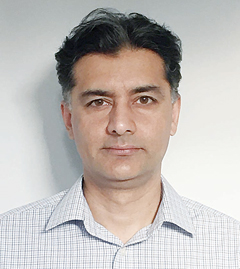 Dr Ranjan Suri
Dr Ranjan SuriKUWAIT: With asthma the most common chronic disease among children and increasing in prevalence, a pediatric respiratory expert from Great Ormond Street Hospital for Children (GOSH) is calling for parents in Kuwait to educate their children about the condition. The burden of asthma is relatively higher in some countries in Africa, the Middle East and Western Europe when compared to the rest of the world. A local survey conducted on Kuwaiti school children showed that around 17 percent of children had physician diagnosed asthma while 30 percent have chronic wheezing.
According to Pediatric Respiratory Consultant Dr. Ranjan Suri, from the London-based hospital GOSH which treats 1,500 patients from the Middle East every year, parents should educate their children about managing the disease to reduce asthmatic symptoms. A key way to do this, according to Dr. Suri, is ensuring all children with asthma have an action plan. An action plan would ideally tell the child when to take their asthma medicines, what to do when their asthma gets worse, what to do in an emergency as well as what their asthma triggers are.
Asthma can develop at any age but is most commonly seen in primary school children. Children have smaller airways than adults, which makes asthma a particularly serious disease for them. "It's essential for children to know how to ask an adult for help and for the people who care for the child to know asthma basics to make it easier for the child to talk about their triggers and warning signs," Dr. Suri says.
"Teaching the child about asthma is an important step in controlling their disease. It is important to teach them about their medication, why they have to take the medicine and how it helps," Dr. Suri adds. "Then, as children become older, they can take the lead in controlling their own asthma." Asthma, which currently affects 235 million people around the world, is a chronic inflammation of airways in the lungs, causing them to become red, swollen and sensitive.
This inflammation makes the airways vulnerable to episodes of difficulty in breathing, called asthma attacks, when people come in contact with 'triggers'. Symptoms of asthma include wheezing, coughing, chest tightness and trouble breathing, especially early in the morning or at night. It is usually a specific substance that triggers asthmatic symptoms. Asthma triggers usually consist of allergens (mold, pollen, animal fur and/or droppings), irritants (cigarette smoke, air pollution), weather (changes in weather, cold air), exercise and infections (flu, common cold).
"Triggers vary from person to person and, depending on the specific triggers, parents may need to make some changes at home and other in environments to reduce the child's exposure to triggers," advises Dr. Suri. Dr. Suri further explains that if asthma is left untreated, asthmatic children may have less stamina than others or avoid physical activities to prevent coughing or wheezing. Therefore, it is important to know when to consult a doctor. "If parents notice any wheezing, coughing, chest tightness or repeated episodes of bronchitis they should get their child checked by a doctor. The doctor will test for asthma by checking for the symptoms through a clinical examination."
Discussing the prognosis for children with asthma, Dr. Suri adds that asthma has no cure but some children will experience a reduction or complete disappearance of their symptoms as they grow older. "As children grow so do their airways, hence inflammation can go unnoticed. There is no cure for asthma, so it is managed through treatments that aim to improve symptoms and prevent attacks." Dr. Suri concludes that with the right care and right treatments, children can have a normal life, avoid missing school, enjoy being active and most importantly breathe easily.
Tips for creating an asthma-safe home:
* Keep rooms well aired, especially if they have new furniture
* Clean thoroughly to control dust
* Avoid spray cleaners and use solids or liquids instead
* Avoid scented products
* Use an air filter or purifier
* Make sure the house is well ventilated










